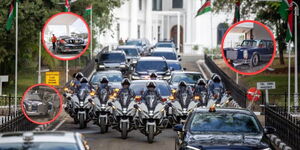It is not strange that submissiveness has to lead the way when one is working with Members of Parliament but for Citizen TV’s Stephen Letoo, his job demands that public interest rules over the honourables.
Letoo, a son of a former Chief in Narok has been trading in MPs’ inner circles since 2013 when he worked as a reporter for Radio Africa Group sister stations Kiss 100 and Classic 105.
New entrants, former journalist Mohamed Ali (Nyali) and Babu Owino (Embakasi East) already admit, Letoo is their favorite and outstanding.
In April, Letoo was caught up in the drama that characterized deported lawyer Miguna Miguna’s return into the country from Canada.
Plain-clothed GSU officers assaulted Letoo and other journalists who were on duty at the Jomo Kenyatta International Airport a day he vividly recalls as he celebrates his 27th birthday on Wednesday, 27 June.
[caption caption="Citizen TV's Stepen Letoo in pain after GSU officers assaulted journalists at JKIA "] [/caption]
[/caption]
We ask him about covering politics in Kenya and his interaction with members of parliament;
When did you find journalism to be an interesting career?
As a young boy, I could see many people visiting our home to watch TV. My father was a chief and he owned the only television set in our village. I became an all-time fan and liked several KBC news anchors.
Later in the years, Kanze Dena also joined the screens and I looked up to what she was doing. While at Kabianga High School, I initiated a weekly assembly news bulletin dubbed ‘Kabianga 100’, this was interestingly the foundation that later saw me rise to land my first job at Kiss 100.
This is after training as a TV journalist at the University of Nairobi where while on campus I focused on writing for Capital Campus site.
You recently in a ‘Moran gear’ led your colleagues in a Maa Song as you congratulated Kanze Dena on her new appointment…
Yes... I am a good singer. She is my very good friend. The song served as my farewell messages as she scales to even much higher heights.
What’s the experience like working as a political reporter?
It is not an easy one..but politicians are starting to know that good or bad news, it is still good for them.
I once did a negative story; ‘Honourable Extravagants’, and I was nearly locked out of my next assignments in parliament. Politicians will always go for their own interest but we normally seek to create a good rapport with them to make our work easier.
What makes it difficult to be a journalist covering politics in Kenya?
Sourcing for political content is tricky. If you don't spend time with politicians, you will lose it all. Most of the time you have to go out of your way and try hanging out with politicians so that you can get the very exclusive kind of stories. This is usually expensive and the employer can not foot the bill for you.
Again, if you get the very distinctive information that can make your work a talking point, you are torn between what to report and what you just have to let go. At times, you are the only one who has the information on the story that the MPs would not want to have out there. The moment you do it, they can easily come for you even if you protect your sources.
[caption caption="Stephen Letoo (in red shirt) leads Citizen TV staff in a farewell song for Kanze Dena "] [/caption]
[/caption]
Haven’t these MPs turned you into a politician given the nature of your job?
My colleagues say I am turning into a politician. When you are always with MPs, they can infect you with political friendship, thinking, affection and there is a risk of forgetting the public good. When covering politics, one can easily get carried away into the political wave. Some can delude you to join politics.
There are suggestions that I should go for some position in Narok County but when that time comes, I would mind representing my people.
How do you handle being framed by the public as a partisan journalist?
With politics, all these accusations of being pro-government of opposition emerge. Unfortunately, it is how we are wrongly judged by our audiences. During elections, people associated me with NASA coalition while my colleague Jackie Maribe was accused to be pro-jubilee.
But our assignments are dictated by contacts and calendar of events. If a media house keeps changing journalists covering political events, it makes it difficult for them to get information since politicians brief trusted reporters consistently.
What irks you when you take time to think about the Kenyan journalism career?
There are a couple of things. Political interference, commercial interests make it difficult to be a journalist. Journalism is not supposed to help the state to govern. The focus is supposed to be in the interest of the public to know. The public is critical to the career. A lot of fear has been instilled in the media. Many people are drifting to Public Relations. Journalism is being left for the brave.
What don't many people know about journalism
Just like any other career, journalism has layoffs and there is tremendous growth when one finds what they are passionate about. Things don't work so well if one only goes for the fame that comes with it.
Someday a single tweet once saved me from a layoff in 2013. About 33 of my colleagues were fired. When we were at Sarit Center lining up to pick sacking letters, I posted on Twitter that I was jobless again. It was the turning point, it changed everything and I was assigned to new duties as their radio reporter. Later the newsroom was merged and I could even write for the paper.
Any story that sent shivers?
I broke the story on how Opposition MPs were planning to interrupt President Kenyatta's address to the nation in parliament. This ruffled feathers in government circles. True to their word, the MPs went ahead and whistled in Parliament.
[caption caption="Stephen Letoo "] [/caption]
[/caption]












